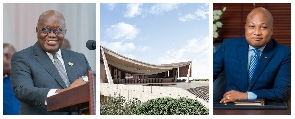 The Cathedral is expected to cost $350m
The Cathedral is expected to cost $350m
For a country that has Christians making up over 70% of the population and its Muslim community being led by a man whose occasional visits to Christian denominations have been well documented as a show of religious tolerance and unity; erecting a facility to serve as a hub of activities for Christendom should under normal circumstance create no fuss and be well-embraced by most if not all of the country’s population.
That is not the case for Ghana's National Cathedral which is being built by the Nana Addo Dankwa Akufo-Addo government. Instead of it being welcomed with open arms, it has sharply divided opinions which perhaps reflect the deep-seated partisanship that lies right behind the layer of religious oneness.
Since 2017 when President Akufo-Addo first announced that his government was going to oversee the building of a facility that will become the symbol of Christianity in the country, there has been scandal after scandal with no end in sight.
With the argument still raging about the expediency of the project, GhanaWeb highlights the thematic areas on which the different scandals have been built.
Concept
The main basis on which the cathedral was going to be built became the first point of divergence between pro and anti-Cathedral brigades.
The initial point which was sold to Ghanaians by the president and his cohorts was that the Cathedral was going to be a fulfillment of a promise Nana Addo Dankwa Akufo-Addo made to ‘his’ God in the event that he ever becomes president, that he will like the biblical David build a monument in His honour.
There, the debate went against him as people questioned why a man’s promise to his God should be the headache of an entire country. Proponents argued that just as the Free Senior High School was a dream project of the president, the National Cathedral is a personal dream that has become national once he won the 2016 elections.
The argument then shifted to the importance of the country Ghana having a monument that reflects the belief system of the majority of the country’s population and a signal of the country’s depth of gratitude to God for His mercies on the country.
Proponents argued that aside the constitution recognizing Ghana as a secular state, the president and his supporters were looking to harness the religiosity of Ghanaians.
The argument of it serving as a tourist centre has also been shot down as critics question the story behind the cathedral that will serve as the pull-factor for potential tourists.
Location
The siting of the National Cathedral became another hot topic as people wondered why it will be situated in one of the traffic-ridden areas in the capital. To them at a time where complaints were made daily about decongesting the capital, a project which will attract thousands of people, as estimated, should be taken away from an area with a notorious traffic record.
The location also came at the cost of recently-built apartments for some judges. The apartments, some of which were less than two years old were demolished alongside other structures to make way for the project and questions have been asked as to why the state had to incur such losses to put up the Cathedral.
The state is currently the subject of a GH¢120 million lawsuit by Waterstone Realty Limited for the demolition of its structure to make way for the Cathedral.
Funding
When concerns were raised about the expediency and prudence of the project, the reason given by the government which was widely shared by proponents of the Cathedral was that the Cathedral was going to be built by contributions from private citizens and organizations and that the state was only going to provide ‘seed capital’.
In fact when James Kwabena Bomfeh, the former General Secretary of the CPP went to the Supreme Court for interpretation on the role of government in religious activities such as the National Cathedral, the Attorney-General is said to have argued to the court that the matter of the National Cathedral, the state was only providing the land and seed money.
Events thereafter has brought to light to the fact that all the GH¢339 million spent on the project so far are from the state coffers and that the fundraising attempts by the government-appointed trustees have not birthed any significant amount.
The revelation only deepened opposition to the project as critics felt empowered by the deception by government and pushed for more answers.
Lack of transparency and questionable payments/decisions
As stated by the Member of Parliament for Afigya Kwabre North, one of the major headaches with the cathedral is the opaque nature with some transactions so far undertaken.
According to him, even MPs on the majority side are not privy to some of the information about payments made in respect of the Cathedral which have been brought to light by the Member of Parliament of North Tongu, Samuel Okudzeto Ablakwa.
Since 2022, Okudzeto has made some explosives allegations including the GH¢26million payment to the Nehemiah Group, GH¢2.6million 'irregular' payment to the JNS Talent Centre which has culminated in arguably the biggest scandal bedeviling the project as well as the alleged double identity of the secretary of Board of Trustees, Reverend Victor Kusi Boateng.
The appointment Sir David Adjaye also courted significant controversy even though the trustees and the renowned architect have explained that the processes leading to the appointment were above board.
Bishop Dag Heward-Mills' letters and resignation
Earlier this week, the Cathedral suffered yet another scandal as letters were written to the secretariat by a former trustee, Bishop Dag Heward Mills.
The founder of the Lighthouse Church International raised issues with the cost, location and lack of transparency around the project.
Dag Heward-Mills who resigned from the Board of Trustees was unhappy that key decision about the project were taken by persons other than the trustees.